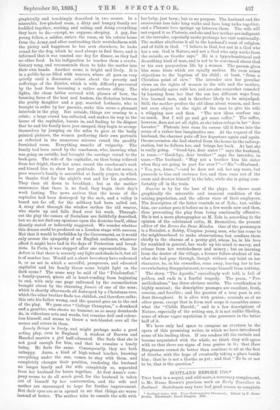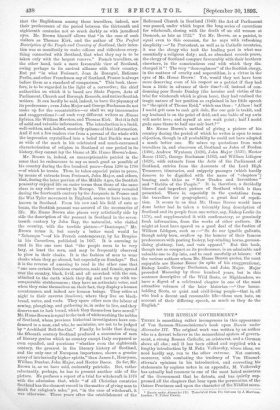SCOTLAND BEFORE 1700.* THIS book is a sequel, and still
more, a necessary complement, to Mr. Hume Brown's previous work on Early Travellers in Scotland. Scotchmen may have had good reason to complain * Scotland before 1700. From Contemporary DOCUIlleMS, Edited by P. Hume Drown. Edinburgh: David Douglas. 1893. that the Englishmen among these travellers, indeed, saw their predecessors of the period between the thirteenth and eighteenth centuries not so much darkly as with jaundiced eyes. Mr. Brown himself allows that "in the case of such visitors as Thomas Kirk, and the author of The Perfect Description of the People and Country of Scotland, their inten- tion was so manifestly to make odious and ridiculous every- thing connected with Scotland, that what they say is to be taken only with the largest reserve." French travellers, on the other hand, took a more favourable view of Scotland, owing perhaps to its ancient alliance with their country. But yet "in what Froissart, Jean de Beaugue, Estienne Perlin, and other Frenchmen say of Scotland, France is always before them as a standard of comparison." This book, there- fore, is to be regarded in the light of a corrective ; the chief authorities on which it is based are State Papers, Acts of Parliament, Church and Borough Records, and native Scottish writers. It can hardly be said, indeed, to have the piquancy of its predecessor ; even John Major and George Buchanan do not make up for the eccentricities—or shall we say inaccuracies and exaggerations P—of such very different writers as 2]neas Sylvius, Sir William Mereton, and Thomas Kirk. But it is full of solid and valuable information. The introduction is a lucid, well-written, and, indeed, masterly epitome of that information. And if not a few readers rise from a perusal of the whole with the impression crystallised into a belief that Buckle was not so wide of the mark in his celebrated and much-canvassed characterisation of religion in Scotland at one period in its history, they cannot lay the blame at Mr. Hume Brown's door.
Mr. Brown is, indeed, an unexceptionable patriot in the sense that he endeavours to say as much good as possible of his country during the five hundred years—from 1200 to 1700 —of which he treats. Thus, he takes especial pains to prove, by means of extracts from Froissart, John Major, and others, that, during the later portion of the Middle Ages, the Scottish peasantry enjoyed. life on easier terms than those of the same class in any other country in Europe. The misery revealed during the fourteenth century by the Jacquerie in France and the Wat Tyler movement in England, seems to have been un- known in Scotland. From his cow and his field of oats or beans, the Scottish peasant was assured of the necessaries of life. Mr. Hume Brown also places very artistically side by side the description of the peasant in Scotland in the seven- teenth century by John Ray, the naturalist, who visited the country, with the terrible picture—" Dantesque," Mr. Brown terms it, but surely a better word would be " Zolaesque "—of his French contemporary, by La Bruybre in his Caraeteres, published in 1687. It is amusing to read in the one case that "the people seem to be very lazy, at least the men, and may be frequently observed to plow in their cloaks. It is the fashion of men to wear cloaks when they go abroad, but especially on Sundays." But it is the reverse of amusing to read in the other case that "one sees certain ferocious creatures, male and female, spread over the country, black, livid, and all scorched with the sun, attached to the earth which they dig and turn up with un- conquerable stubbornness ; they have an articulate voice, and when they raise themselves on their feet, they display a human countenance, and indeed are human beings. They retire at night to their caverns (tanieres), where they live on black- bread, water, and roots. They spare other men the labour of sowing, ploughing, and gathering in, in order to live, and they deserve not to lack bread, which they themselves have sowed," Mr. Hume Brown is equal to the task of whitewashing the nobles of Scotland, whom previous historical investigators have con- demned to a man, and who, he maintains, are not to be judged by "Archibald Bell-the-Cat." Finally, he holds that during the fifteenth century Scotland produced a succession of men of literary genius which no country except Italy surpassed or even equalled, and questions "whether even the eighteenth century, the greatest in the literary history of Scotland, and the only one of European importance, shows a greater array of intrinsically higher spirits," than James I., Henryson, William Dunbar, John Major, and Hector Boece. So far,-Mr. Brown is, as we have said, eminently patriotic. But, rather reluctantly, perhaps, he has to present another side of the picture. He prefaces a report of a trial for witchcraft in 1576 with the admission that, while "of all Christian countries Scotland has the cleanest record in the matter of giving men to death for religion's sake," yet, "in the case of witchcraft, it was otherwise. Three years after the establishment of the Reformed Church in Scotland (1563) the Act of Parliament was passed, under which began the long series of executions for witchcraft, closing with the death of an old woman at Domed, as late as 1722." Yet Mr. Brown, as a patriot, is equal even to this occasion, for he says with refreshing simplicity :—" In. Protestant, as well as in Catholic countries, it was the clergy who took the leading part in what was essentially a religious duty; and, as abundant records prove, the clergy of Scotland compare favourably with their brethren elsewhere, in the conscientious zeal with which they dis- charged it"! The very "thoroughness" of the Scottish clergy, in the matters of cruelty and superstition, is a virtue in the eyes of Mr. Hume Brown ! Yet, would they not have been more deserving even of his respect as a patriot if they had been a little in advance of their time ?—if, instead of con- demning poor Bessie Dunlop (the heroine and victim of the trial for witchcraft which is given here), they had realised the tragic nature of her position as explained in her little speech to" the spirit of Thome Reid," which ran thus : " Allem ! half I nocht grit cams to mak grit dale, ifor our geir is trakit, and my husband is on the point of deid, and ane babie of my awin will nocht lave; and myself at ane walk point ; half I nocht gude cans thane to half ane Bair hart ? "
Mr. Hume Brown's method of giving a picture of his country during the period of which he writes is open to some objection, though in all probability he could not have adopted a much better one. He mixes up quotations from such travellers in, and observers of, Scotland as John of Fordun (1380), Andrew Wyntoun (1426), John Major (1521), Hector Boece (1527), George Buchanan (1582), and William Lithgow (1628), with extracts from the Acts of the Parliament of Scotland, entries from the Accounts of the Lord High Treasurer, itineraries, and snippety passages (which hardly deserve to be dignified with the name of chapters ") bearing such titles as "New Trades and Inventions" and "Habits of the People." It is, therefore, a decidedly blurred and imperfect picture of Scotland which is thus presented. There is, especially in the quotations from the travellers (or geographers), a great deal of repeti- tion. It seems to us that Mr. Hume Brown would have done better had he taken a tolerably long description of Scotland and its people from one writer, say, Bishop Leslie (in 1578), and supplemented it with confirmatory, or genuinely fresh information, from the works of other authors. He might at least have spared us a good deal of the fustian of William Lithgow, such as :—" So do our ignoble gallants, though nobly born, swallow up the honour of their famous predecessors with posting foolery, boy-winding horns, gorman- dising gluttony, lust, and vain apparel." But this book, though not so compact as its predecessor, is an admirable and valuable one to dip into, and to read carefully at leisure. Of the various authors whom Mr. Hume Brown quotes, the most enjoyable are Hector Boece (in spite of his exaggerations), Bishop Leslie, George Buchanan, and John Major. Major preceded Macaulay by three hundred years, but in this sentence descriptive of the Wild Scots, or Highlanders, we have a digest of a celebrated chapter in one of the most attractive volumes of the later historian :—" Our house- holding Scots, or quiet and civil-living people—that is, all who lead a decent and reasonable life—these men hate, on account of their differing speech, as much as they do the English."



































 Previous page
Previous page